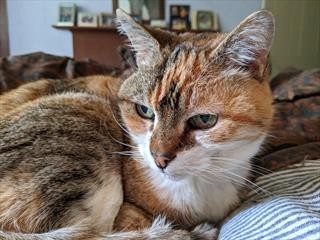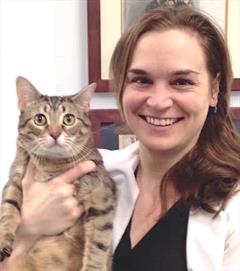Isabella

Photo by Dr. Alice Kroger Marrinan
Dr. Neil Marrinan says his feisty feline, Isabella, could teach us something about enduring quarantine, having recently gone through it for a non-coronavirus medical condition.
 From tigers and lions in the Bronx Zoo to house cats, felines have topped much of the recent non-human COVID-19 news. The latest involves the possible transmission of SARS-CoV-2 between cats and mink in the Netherlands, where authorities suspect the virus spread from the animals to a Dutch farmer.
From tigers and lions in the Bronx Zoo to house cats, felines have topped much of the recent non-human COVID-19 news. The latest involves the possible transmission of SARS-CoV-2 between cats and mink in the Netherlands, where authorities suspect the virus spread from the animals to a Dutch farmer.
Correspondence about preliminary research findings by a team at the University of Wisconsin and colleagues in Japan, published May 13 in the New England Journal of Medicine, bore the provocative title "Transmission of SARS-CoV-2 in Domestic Cats."
A headline in the Wisconsin State Journal describing the research was emphatic: "UW-Madison led study confirms cats can be infected with COVID-19, transmit to other cats."
CBS News took it a step further, stating, "Study shows cats can easily spread coronavirus to each other …"
While the finding caught widespread attention, the study in question involved a total of six cats — a minuscule sample size in research terms.
Since ancient Egypt, cats have occupied a prominent spot in world affairs, but how much of the recent feline news fever is fact and how much is unfounded fervor?
Among animals other than people, cats aren't alone in their vulnerability to infection with SARS-CoV-2, the novel coronavirus that causes COVID-19. Research published April 8 in the journal Science found that cats and ferrets are susceptible, while the virus replicated poorly in dogs, pigs, chickens and ducks.
With new information about SARS-CoV-2 emerging daily, it's challenging enough to keep track of the behavior of the virus in humans, let alone other species. The VIN News Service gathered a panel of feline experts to help sort through the current science on cats and COVID-19.
Melissa Kennedy, DVM, PhD, DACVM, is an associate professor in the department of Biomedical and Diagnostic Sciences at the University of Tennessee College of Veterinary Medicine, and a consultant for the Veterinary Information Network, an online community for the profession and parent of the VIN News Service. Kennedy's research interests include coronavirus infections of cats.
Alice Wolf, DVM, DACVIM, DABVP (feline), is an emeritus professor of small animal veterinary clinical sciences at Texas A&M University and chief medical consultant for VIN.
Lauren Demos, DVM, DABVP (feline), is an executive board member of the American Association of Feline Practitioners and a feline medicine consultant for VIN.
Neil Marrinan, DVM, is owner of Old Lyme Veterinary Hospital, a companion animal practice in Connecticut.
Interviews with the panel took place via email in April and May. During that time, more domestic cats were diagnosed with COVID-19, a diagnostic test for pets became commercially available, and three domestic cats were experimentally infected with the virus by the University of Wisconsin-Madison team.
Can my cat give me COVID-19?
Kennedy

UT College of Veterinary Medicine photo
Dr. Melissa Kennedy
Kennedy: [Based on the] current evidence, cats are likely not epidemiologically important in transmission.
Wolf: As Melissa says, it’s not at all likely, from the information that we have so far.
Demos: There is no data at present to suggest that pet cats can transmit COVID-19 to humans.
Marrinan: It is conceivable that a cat could transmit the virus that causes COVID-19 to a person. But it is very unlikely. The only practical way for your cat to get infected is if you or a person shedding the virus snuggled with your cat or had other close contact. This would almost have to occur in an already-infected household. People are the source of transmission in this pandemic. I think we already know, after millions of cases worldwide in people, that cats are neither the source nor vector for this human disease. I am comfortable with that and do not expect it to change.
Can I give COVID-19 to my cat?
Kennedy: It's possible to transmit the virus to one's cat, likely with close contact; however, cats don't appear [for the most part] to get sick. Bottom line, anyone diagnosed with the virus should self-isolate from people and pets.
Wolf: The U.S. Centers for Disease Control and Prevention recommends that people with COVID-19 limit contact with their pets, including avoiding stroking them, being licked and sharing food.
Demos: Given what data is currently available, I think this is a more likely real-world concern: that we, as humans, are more likely to infect our pets than they are to infect us. Certainly, as testing options and availability grow, we will have more clarity on the situation. I would also add that even if a cat became infected with COVID-19, this does not necessarily equate to your cat then being capable of passing the virus onwards to another cat or human.
Wolf

Veterinary Information Network photo
Dr. Alice Wolf
Proper precautions that you would take around any family member, especially if you are positive for the virus, would be reasonable to apply to your pets, as well. Therefore, it would be paramount for the health of everyone in the household to continue to practice good hygiene, even when self-isolating at home and not showing any signs of COVID-related illness.
Marrinan: Yes. There was a report of a sick cat in Belgium whose owner had COVID-19.
The best way to avoid getting sick from COVID-19 is to not get the virus. The best way to do that is to isolate yourself in a household where everyone else is doing the same.
If someone in your home is ill or might be, it is prudent to keep all pets and people separate to reduce the risk of infecting others. I was thinking more about my own cat. She sleeps on a pillow that she considers hers. She gives up a corner to me so as to sleep on my head because we keep our old house at 60 [degrees] at night. Will I stick to my cautious approach to isolate from the cat as well as people, should I or a family member get sick?
The tigers presumably don't snuggle, being Bronx-proud and all, yet they got it.
I keep hearing different things about whether my cat can be a fomite (an object that transmits the virus without being itself being infected). How worried should I be?
Demos

Photo by Jennifer Osterman
Dr. Lauren Demos with her cat, Pancake.
Demos: More porous objects (including cat fur) are speculated to be less likely to promote virion [virus particle] survival. Since this virus is also generally considered to be spread most efficiently through airborne particles, [pets as fomites] is a route of infection that, at present, is probably not of major concern.
Marrinan: Cats can be fomites if there's enough virus in the home. [However], I would not worry at all and don't advise my clients to worry.
My cat goes outside. Can she catch it from another cat and/or bring it to my family?
Kennedy: Not from current evidence. More at risk from other pathogens!
Wolf: Agree with Melissa. Cats are pretty good naturally at social distancing from other non-cohabiting cats. Much more risk of them getting injured or acquiring other diseases.
Demos: This would be considered an unlikely route of exposure, for the reasons noted by Alice and Melissa.
Marrinan: This is theoretically possible but not realistic. ... Your cat may not maintain social distance from other cats, and so we are still seeing cat-bite abscesses [from fights]. If you were considering making your cat purely indoors, that's fine. I don't worry about cats bringing in COVID-19 from outside.
My cat has a veterinary appointment for another issue. Is it safe to bring him to the clinic right now?
Demos: I think as a profession, we are keenly aware of the current need to take appropriate precautions for ourselves and our patients. With many veterinary practices limiting appointments to only those that are considered essential health-care services, exposure to all pathogens that a cat would normally encounter in the clinic should, theoretically, be decreased. Tongue in cheek, given the stringent PPE [personal protective equipment] and cleaning protocols that are in place additionally, this may actually be a safer time than normal for your cat to be seen.
Marrinan: Yes. At our hospital you would be met outdoors and not have to leave your car. You would not come close to any people.
Now that there is a test for pets, should I get my cat tested?
Kennedy: Not as part of routine diagnostics
Wolf: Agree with Melissa.
Demos: While I don't think that we should presently be "blanket testing" cats, I do think that coronavirus should now be a differential that veterinarians consider for cats with appropriate, recent-onset clinical signs. I am always a proponent of having more information, rather than not enough. The real trick is understanding how PCR [a diagnostic test that involves a technique called polymerase chain reaction] works, and not automatically equating a positive test to fulfillment of Koch's postulates [the criteria needed to establish a causative relationship between an organism and a disease]. My job, as a veterinarian, is to gather the data, and then to make an appropriate assessment of that data to enable a diagnosis.
Is there anything else you can think of that cat owners and their veterinarians should know or pay attention to with regard to COVID-19?
Marrinan

Photo courtesy of Dr. Neil Marrinan
A companion animal practitioner and clinic owner, Dr. Neil Marrinan wrangles adoptable kittens from his local animal control.
Demos: There is so much we currently don’t know about our household felines and their interplay with COVID-19. To expand on that sentiment, in general, there is a paucity of data in regard to COVID-19. Obviously, new studies and data will continue to be generated very quickly, given the current pandemic environment, and as a veterinarian, I will continue to watch the findings with great interest. Truly, these are unprecedented times for all members of health-care teams — human and veterinary.
I am hopeful that COVID-19, since the virus is a coronavirus, might offer a neat synergism with further research into feline infectious peritonitis [FIP, which is caused by a coronavirus]. Conversely, it would be wonderful to see some of the work that has been done by veterinarians researching FIP treatments, translate into workable treatments for COVID-19 in human medicine. The emphasis of One Health here should be paramount. What is good for feline medicine and veterinary medicine can be equally good for humankind. I would love to see something positive arise from this crisis in that regard.
Marrinan: Cats themselves are observers of the pandemic rather than participants, but research on cats and coronavirus has provided some of the basic knowledge about this group of viruses. It was often done in service of cats by veterinarians and now it is critical to our understanding of this human disease.
My cat, Isabella, had treatment for thyroid disease right after Christmas. She got a shot of radioactive iodine, so she had to be quarantined for the month of January.
She is old and blind and opinionated. For that month, she was radioactive, as well. I felt bad leaving her alone, but in retrospect, I am grateful for the experience. We got through it just fine, so we are prepared for the possibility we may have to be separated for a few weeks if someone in our home is a suspect case.
Isabella had lots to say about quarantine at the time. She complained that I did not replenish her food bowl all the time. She was annoyed that I moved the bowl, a little bit, when I filled it. She was bored. But she is back to normal and has forgiven me for giving her the temporary nickname Notorious RBC, the Radioactive Blind Cat.
If she can do it, we can do it.
This story has been changed from the original in its characterization of the situation on mink farms in the Netherlands.